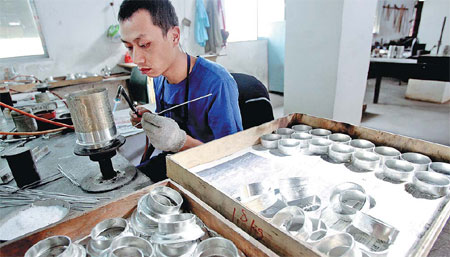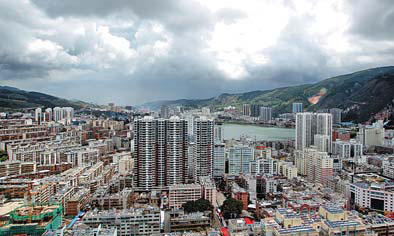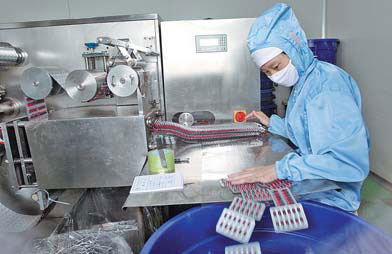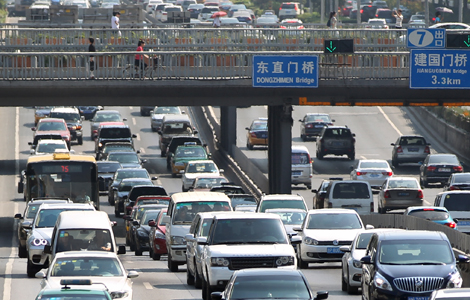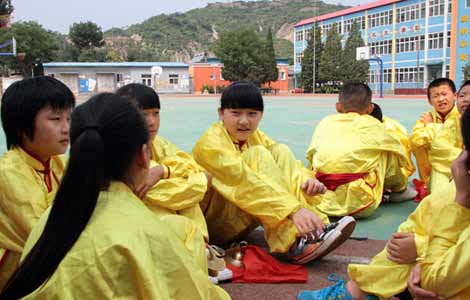Tin city explores economic shift
Updated: 2013-09-02 07:38
By Hu Yongqi in Gejiu, Yunnan (China Daily)
|
||||||||
|
A worker makes products from tin at a factory in Gejiu. Photos by Zhang Wei / China Daily |
|
A bird's-eye view of Gejiu city in Yunnan province, which boasts the world's largest deposits of tin. |
|
The pharmaceutical industry is scheduled to play an important role in Gejiu's economic transformation. |
Mining industry has caused heavy metal pollution and desertification, reports Hu Yongqi in Gejiu, Yunnan province
Peng Jianguo was giving instructions to his employees in the metals recycling unit at a new facility in Gejiu, Yunnan province, site of 24 percent of the world's tin deposits.
Peng, deputy general manager of Green Novo, said the factory has been extracting metals from the dust particles discharged by iron and steel plants since 2003. Annual tin production has increased to 40,000 metric tons, a rise of 50 percent from two years ago.
"The company has eight collection centers around the country. Our goal is to recycle the metals and reduce pollution as much as possible," said Peng.
In the facility, the dust undergoes five procedures, such as ore dressing - separating the metal from the dust - and kiln smelting, to recycle iron, tin and zinc.
In the warehouse, containers of tin blocks were lined up and ready to be loaded onto trucks. Iron and steel plants are eager to work with Peng's company, which helps them dispose of their industrial waste and reclaims iron and other metals.
Iron waste, once a burden to manufacturers, has become a precious resource for Green Novo, which holds seven patents in metal recycling and has annual revenue of 4 billion yuan ($654 million), said Peng.
Two years ago, Green Novo moved to its current site, aided by favorable policies such as tax concessions and land offered by the government of Gejiu, the former capital of Honghe Hani and Yi autonomous prefecture in Yunnan province.
The city is internationally renowned for its huge tin deposits and the metal has been a pillar of the local economy since it was first discovered there during the Eastern Han Dynasty (AD 25-220). Gejiu was ranked among the top 10 county economies in western China in 2012.
However, while mining has brought prosperity, it has also resulted in long-term problems, especially heavy metal pollution and rocky desertification.
"Currently, Gejiu has more than 200,000 tons of tin deposits and the local mines can produce 30,000 tons each year. That means tin mining can only survive for the next decade, or 20 years at the most," said Wang Yongchang, director of the Gejiu Development and Reform Bureau. "What if all the mines run out of reserves? Identifying the next growth engine for the local economy is a serious question on our agenda."
In 2008, Gejiu was chosen by the State Council as one of the first batch of 12 resource-exhausted cities that must transform their unsustainable economies. However, the mining of non-ferrous metals still accounts for 70 percent of the locality's economic output, according to the local development and reform bureau. The financial support provided by the central government will cease in 2015, but the transformation process will take far longer to complete.
Transformation urged
Peng said his factory employs 600 workers, 80 percent of whom are local residents. Because the profit margin for recycling metals can be as high as 30 percent, the employees earn a higher wage than the average miner or smelting worker. However, Green Novo is just one of a small number of pioneers attempting to change track from the traditional energy-consuming, high-emissions industries.
Gejiu produced 70,000 tons of tin last year, and 85 percent of the raw materials were imported, according to Wang Yongchang. However, the mining industry has left large areas of land damaged and unproductive because of desertification.
As early as 2007, the massive amount of mining had caused irreparable damage to the land. More than 40 square kilometers, 30 percent of the city's mining area, were used to house mine dumps and slag heaps. That led to problems and accidents; six of the city's townships were hit by flooding and landslides, resulting in 174 casualties and 1,300 dead livestock. Hundreds of houses were wrecked and highways were blocked. One township, Kafang, had to be relocated because of the threat posed by repeated landslides.
This single-industry structure posed a potential threat to Gejiu's economic growth, according to Wang Yongchang. In 2008, tin futures plummeted by almost 30 percent and more than two-thirds of Gejiu's 280 tin producers suspended operations.
At the end of 2007, roughly 30 State-owned enterprises, most of them in the tin mining industry, went bankrupt and 25,000 people lost their jobs.
The layoffs drove some women to turn to prostitution, which rapidly led to a rise in the number of AIDS cases in the city. The abuse of drugs, especially heroin, has also had a huge impact on the local society. Gejiu has more than 5,000 drug addicts, most of whom live in and around the shabby mining sheds, according to a report by Yundi Harm Reduction Network, an NGO that focuses on AIDS prevention and drug control in Yunnan and the Guangxi Zhuang autonomous region.
In the mining areas, women from Hunan and Sichuan provinces provide sexual services, said Dong Jieyu, a retired researcher in women studies from the Yunnan Academy of Social Sciences. "In many cases, the act is committed outside the workers' sheds. In those circumstances it's impossible for the women to use condoms and prevent themselves from becoming infected with the HIV virus."
Dong said many of the sex workers have to continue plying their illegal trade just to support their drug habits.
The mine owners are aware of the consequences of maintaining the old business model. Ma Da, deputy general manager of Zhenxing Group, which has been operating in the area for 30 years, said the mining of tin and other non-ferrous metals consumes too much power and resources and generates a huge amount of waste. He said one-third of the mines in his hometown of Shadian have turned to other business in response to depressed state of the market. "If we continue to mine tin, all that will be left for our children will be barren mountains and rocky land," he said.
"The city must embrace change and shift its economy to a healthier model by prolonging the tin production chain to provide greater added value and making the most of its rich natural resources," said Wang Zhong, the mayor of Gejiu.
Ma said that in developed countries, such as the United States, much of the metal used in industrial processes is recycled, with more than 85 percent of raw tin and lead brought in from overseas. "We will cease our mining activities in five years and my factory will recycle imported non-ferrous metals," he said.
New industries
Wang Zhong said Gejiu will focus on developing the pharmaceutical industry, including Yunnan Yunhe Pharmaceuticals Inc, while supporting a few major enterprises in the suburbs. Two of the city's pharmaceutical companies have jointly been awarded more than 30 production certificates for traditional Chinese medicines.
As part of an economic transformation plan approved in 2010, the city will direct funds from the central and provincial governments to the biopharmaceutical and tin culture industries, a move that should boost employment and tourism, said Wang Yongchang.
"Gejiu has a tradition of technical innovation and marketing in the pharmaceutical industry. In addition, the city is also close to Laos and Cambodia, where some of the raw materials we use originate," he said.
On nine new production lines, medicines were being automatically packed and loaded onto trucks. Duan Bo, assistant to the general manager of Yunnan Yunhe, said the company earned revenue of 540 million yuan in 2012 and paid 60 million yuan in tax. That's approximately three times the amount in 2007, thanks to government support in terms of land provision and the cultivation of new talent.
Yunnan Yunhe employs more than 400 locals, all of whom have received a college-level education, and the company encourages local farmers to produce the raw materials. In three townships, more than 500 hectares of land have been sown with trees that produce the raw material for dragon's blood capsules, a famous branded medicine in Yunnan, used primarily to reduce bruising. The company will expand the planted areas to about 10,000 hectares within five years, according to its schedule. A company news release estimates that the move will bring the farmers income of more than 5 million yuan.
"The average monthly salary for workers is about 2,500 yuan and that will rise as the company grows," said Duan. "More important, a stable job at the company might be the a good option for those who were laid off."
Duan said the planting will be mutually beneficial, because the company's raw material costs will be reduced and the farmers will be able to stay in their home area and earn a decent income.
Solutions
About 100,000 people work in the local mining industry. Although profitable, the industry has caused numerous healthcare problems for the city authorities, said Wang Yongchang. "Occupational diseases, black lung and silicosis in particular, cost the workers a lot of money," he said, referring to the bills for medical treatments.
About 53,000 of Gejiu residents rely on basic State support. That's roughly 10 percent of the total number of claimants in Yunnan, even though the city is home to just 1 percent of the provincial population, according to Gejiu's development and reform bureau.
However, the effect of the transformation is already becoming apparent. During the past six years, the urbanization ratio has increased to 70 percent from around 40 percent. Moreover, the average per capita disposable income of Gejiu's urban residents rose to 17,915 yuan last year, more than double the amount in 2006, but still just 72 percent of the national average, the same proportion as seven years ago.
Since 2008, the central government has awarded Gejiu 780 million yuan. The money is part of a plan to accelerate the economic transformations of 69 resource-exhausted cities. The city government will receive 200 million yuan per annum until 2015 to improve its cultural and manufacturing industries.
But it's a costly business; after paying the salaries of public servants and funding infrastructure projects last year, the city government had little left from its initial budget of 2.1 billion yuan, said Wang Yongchang. In the next three years, the city will require a further 3.5 billion yuan for economic transformation.
Like many other resource-exhausted cities, Gejiu's transformation will take at least 30 to 50 years, said Wang Yongchang. "The fostering of new industries is not something that can be achieved simply by saying the word - instead, it will require patience and financing. The city has contributed its resources and paid taxes for the development of our country, and now it's time for the central government to invest more in Gejiu."
Contact the writer at huyongqi@chinadaily.com.cn
Li Yingqing and Guo Anfei contributed to this story.
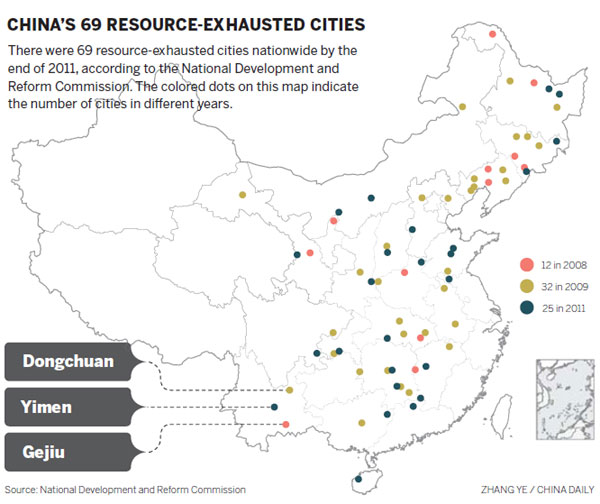
(China Daily USA 09/02/2013 page7)
Most Viewed
Editor's Picks

|

|

|

|

|

|
Today's Top News
Top companies should adapt to slower growth
DPRK blames US for canceled envoy visit
Chinese economy 'very strong' in long term
Sowing the seeds of sustained growth
Experts: US unwise to wage war on Assad
SASAC head target in graft probe
Eurasian nations focus on Net
Trending news across China
US Weekly

|

|
